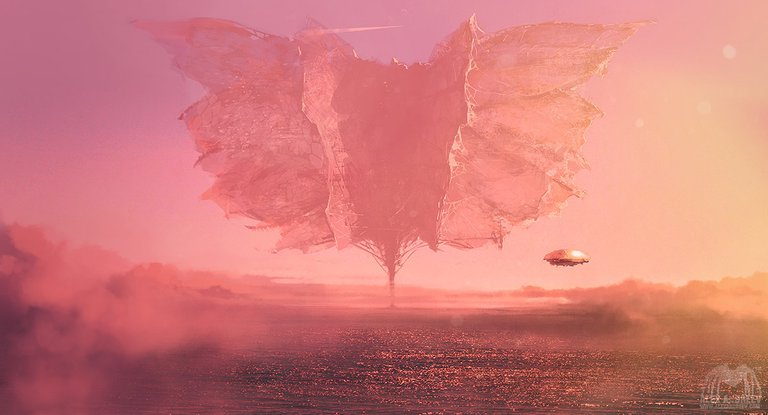
Alex Andreyev behance.net
CC BY-NC-ND 4.0
PL
14 maja 2022 r. w krakowskim Kólewstwie Bez Kresu odbyło się kolejne spotkanie klubu książki. Tym razem omawialiśmy Solaris Stanisława Lema. Na spotkaniu było łącznie dziewięć osób, w tym dwóch wolnych słuchaczy. Jak na razie jest to rekord frekwencji. Wnioski z dyskusji odtwarzam na bazie zawodnej ludzkiej pamięci, bo notatki niestety zgubiłem. Cała debata trwała ok. dwie godziny, więc padło o wiele więcej niż tutaj opiszę.
Książka zasadniczo wszystkim się podobała. Był to pewien zawód dla @lpa, który lubi emocje w debatach 😉.
Wszyscy zwróciliśmy uwagę na to, że głównym tematem powieści były ludzkie ograniczenia oraz konieczność poszukiwania odniesień do znanych zjawisk i pojęć. @wayward-dreams stwierdził nawet, że Lem poniekąd szydzi z naukowców opisując rozmaite hipotezy dotyczące planety i oceanu. Jako przykład podał opisaną w książce historię naukowca piszącego książki na podstawie innych książek. Z ludzkich ograniczeń wynikało to, że ocean jest wielką zagadką dla ludzi, spodziewających się spotkania istot podobnych do siebie.
Poruszyliśmy też kwestię natury fantomów, ich samoświadomości i związków z konkretnymi badaczami. Zwrócono tutaj uwagę na uwagę to, że Sartorius i Snaut usilnie starali się, żeby nikt się nie dowiedział, kto z nimi jest. Mówiliśmy też o wyrzutach sumienia Kelvina wobec kopii Harey, która być może cały czas żyła w rakiecie umieszczonej na orbicie planety.
Padła też teza, że ludzie także są dla oceanu zagadką. Być może materializując najsilniejsze wspomnienia znalezione w mózgach badaczy chciał ziścić ich największe pragnienia, nie wiedząc, że to ich najboleśniejsze traumy. Było tu odniesienie do wspomnianego pod koniec powieści pojęcia boga-idioty — niezwykle potężnej istoty, która jednak nie wie, co robi.
Zastanawialiśmy się także nad zakończeniem. Nie było dla nas jednoznaczne. @wayward-dreams wyraził swój pogląd, że doświadczenia z oceanem złamały pychę Kelvina i dopiero na koniec może podejść do Solaris z należytą pokorą. Zasadniczo uznaliśmy zakończenie za otwarte.
Zainteresowanych dołączeniem zapraszamy do Krakowa na Biskupią 18/1 w drugą sobotę miesiąca. Książkę wybieramy w głosowaniu pod odpowiednim postem @lpa publikowanym w społeczności Królestwa Bez Kresu (C/KBK). Językiem dyskusji jest angielski.
EN
On May 14th, 2022, Cracow's Kingdom Without Limit hosted yet another meeting of its bookclub. This time, we discussed Solaris by Stanisław Lem. There were nine people in total, including two listeners, which is the top attendance so far. I'm reconstructing the conclusions from the discussion because I've unfortunately lost my notes. The entire debated lasted about two hours, so much more was said than this post can contain.
Everyone basically liked the book. It was some disappointment for @lpa, who likes more heated debates 😉
We all noted that the main topic of the book is the human limit and the necessity to seek references to familiar phenomena and concepts. @wayward-dreams even remarked that Lem to some extent mocks scientists by describing various hypotheses concerning the planet and the ocean. He provides an example of a scholar writing a book based on other people's books. Also, human limits led to the ocean being a huge enigma for people who expect to meet beings similar to themselves.
We also discussed the nature of the simulacra, their self-awareness, and their relationships to the specific researchers. It was pointed here that Snaut and Sartorius make much effort to prevent the others from knowing who is with them. We also mentioned about Kelvin's pangs of conscience regarding the copy of Harey that might be alive in the rocket orbiting the planet throughout the rest of the novel.
There was a statement that humans might also be an enigma for the ocean. Perhaps, by materialising the strongest memories it has found in the researchers' brains it wanted to fulfil their greatest desires, but it hasn't realised that these were their most painful traumas. There was a reference to the notion of an idiot god—an amazingly powerful being that does not know what it's doing.
We also reflected on the ending. We didn't find it unambiguous. @wayward-dreams said that the experience with the ocean have broken Kelvin's pride and only at the end is he able to be humble while facing Solaris. We basically reached the conclusion that the ending is an open one.
Should you be interested, feel free to join us in Cracow at Biskupia 18/1 on the second Saturday of the month. The book is selected by voting in the comment section of a related post by @lpa that he publishes in Kingdom Without Limit's community (C/KBK). The discussion is in English.
❧